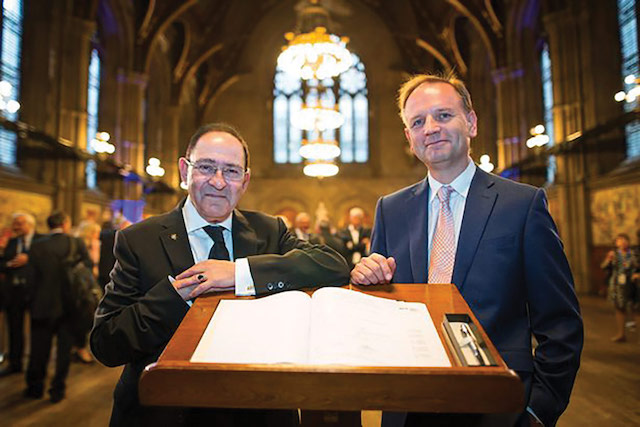How to save twenty billion quid
The NHS can find the money it needs by investing in leadership and technology – and trusting staff to root out waste.

Last month, I asked an audience of doctors in London how much we spend on the NHS. No one knew. One consultant told me it was £50m! When the NHS needs to save over £22bn, this is a big problem. If doctors don’t know how much things cost, they don’t know the value of the work they do.
I think the NHS can save £20-25bn by focusing on how it wastes money, engaging fully with staff and using excellent IT. Good quality care is not cheap, but poor quality care costs a lot more and leads to many human tragedies.
I’m very proud of the NHS. I’ve been passionate about making our health and social care services the best and safest in the world since my early days as a paediatric consultant in Bury in the 1990s. Within weeks of my starting, two babies suffered serious harm because of mistakes in my department. I was devastated. I wanted to go back to India but feared that my Mum and Dad would think I was a useless doctor who had brought shame on our family.
Look at everything
But my mentor at Oxford told me, “Umesh, you owe it to those two babies to learn why doctors make mistakes and how to prevent these tragedies”. Over the years, I’ve realised that we have to look at everything: leadership, professional regulation, clinical governance, organisational culture, staff and patient engagement, subconscious bias and institutional racism. I worked with four consultants and our wonderful staff to turn the department around, implementing consultant-lead handover, excellent governance and team-working, and strong support for all staff.
Many of the those same failings also lead to a great waste of money. Making NHS hospitals safer and better will help us to find the money we need. And a better, more responsive healthcare system will save money too.
Let’s look at some specifics.
The NHS spends £12bn a year on medicines, but CCG data suggests £750m is wasted on medicines that are never used by patients. As much as £1bn is wasted prescribing medicines for elderly patients in nursing homes where there is no evidence of added benefit. Without effective IT systems, hospitals, GPs and others keep on prescribing medicines without knowing what else has been prescribed.
Avoidable patient safety incidents probably cost at least £3bn a year. When a patient is harmed, they stay in hospital longer or get readmitted. Complaints, legal and human resource costs all add up. Last year, the NHS spent £1.2bn on medico-legal bills; with the statutory duty of candour that could rise to £15-20bn!
Safer hospitals are more efficient
At my current trust, Wrightington, Wigan and Leigh, we’ve reduced patient harm by 90% since 2007. 450 fewer patients die in our hospitals and complaints have dropped by around 35%. We were rated in the bottom 20% for staff happiness in 2011; now we’re the third best in the country. We’re not perfect but, by making patient safety everyone’s business, engaging with staff and patients and having robust governance everywhere, we’ve come a long way.
Why does clinical productivity vary so much? Poor team-working, inadequate IT, too many locum staff and high sickness absence rates are all factors. Most consultants work hard but some misuse their authority, while waiting list initiatives and private practice introduce perverse incentives. But if every consultant was as productive as the best, we could probably save £5bn a year.
How much does bullying and discrimination cost the NHS? Unhappy staff are more likely to be off sick, leave, fail to work in teams and provide poor care. It’s difficult to quantify the cost, but Public Health England estimates that unusually high rates of sickness absence alone cost the NHS £2bn annually, without including the cost of expensive agency staff to fill the gaps.
Add in £750m wasted on management consultants, £5bn in efficiency savings identified by Lord Carter, and the unquantifiable cost of our fragmented healthcare system, and £20bn may be a conservative estimate. I could be wrong – and, yes, some of these savings overlap – but does anyone doubt that they’re substantial?
We need the right leaders
All this requires the right leaders, not just good managers. Managers are forced to focus on finances and targets, and that puts staff under tremendous pressure. If you don’t meet your targets, the CQC and Monitor come down on you like a ton of bricks. Your name is published in the HSJ. And who wants that?
At Wigan, we identified 22 medical leaders by asking junior doctors, nurses and GPs four questions: Who’s the best consultant in that department? Who’s a nice human being? Who’s a good team player? Who do you want to see as a leader, and why? They’re the people to ask; nurses know who they want to call when a patient is very sick, and who they want to avoid.
60% of those consultants didn’t want to be leaders. Some doubted they could make a difference or thought leadership was just for managers. We need to invest in making good doctors and nurses into great leaders. At Wigan, we introduced our own internal training programme and today we have 40 consultants who are fantastic leaders or ready to become the leaders of the future.
We all work in silos
I think we’ve been on the wrong track since the creation of foundation trusts. Funding by activity was a huge mistake. You get £400 for each day a patient stays in hospital, so there’s no incentive to discharge them or not to admit them in the first place. 30% of patients in hospital could be treated in the community, which costs £100 a day. Most managers work very hard but we need to work smarter by investing in community and primary care and making the best possible use of IT.
In practice, competition, choice and the purchaser-provider split has failed to drive down costs. Patients from Wigan won’t even go to Leigh – eight miles away! We introduced something into the system that patients didn’t want and the NHS didn’t need, but which actually inflated our costs.
I’m convinced Devo Manc can be the future for the whole country, providing everyone works together. With one central funding point – the Greater Manchester Health and Social Care Board – we can eliminate duplication and waste while strengthening democratic accountability. And we can get the best out of all our hospitals by targeting our resources where they’re really needed. STPs lack this central driving force and transforming the NHS without integrating social care won’t change much. We need radical action and to transform both at the same time.
Related News
-

Strange ways, here we come
Creating a ‘neighbourhood NHS’ will demand a different mindset, unfamiliar ways of working and difficult decisions on finances and staffing. Middle managers as well as senior leaders will play a big part in making it happen, writes Nigel Edwards.
-

Labour’s reforms: a mixed bag for managers
Ahead of the ten-year plan, Wes Streeting and NHS leaders have been sketching out some ideas for NHS reform. Jon Restell and Rhys McKenzie explain what these initial proposals could mean for managers.
-

Jon Restell’s Leading Edge | Giving managers legitimacy is the key to making reform work
The false trade off between the frontline and everybody else has become a deep-seated belief in a two-tier workforce. The health secretary needs to unite all NHS staff and give managers permission, encouragement and the tools they need to get his reforms off the ground.